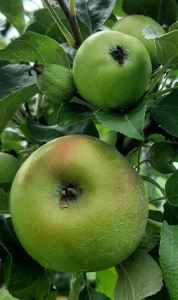Tree Fruit Newsletter — August 8, 2023
Predicted McIntosh Harvest Dates
Sanford: Sept. 18
Turner: Sept. 23
Madison: Sept. 26
Caribou: Sept. 24

The predicted midpoint of the optimum harvest window for cold storage is influenced by the degree days in the 40 days after petal fall. This is based on a study dating back to 1960 and using an older strain of McIntosh. I calculated degree days for each region using temperatures recorded at NOAA stations and best guesses for petal fall dates for areas other than Turner. A predictive equation for Honeycrisp has not yet been calculated, but Honeycrisp orchards can be highly variable in when they begin to ripen.
To delay the start of harvest, apply ReTain® 3 to 4 weeks ahead of anticipated first pick.
To extend the harvest without delaying the start, apply ReTain 1 to 2 weeks before anticipated first pick, keeping in mind that ReTain has a 7-day preharvest interval.
To delay the start of harvest and to extend the harvest window, apply Retain at 3 to 4 weeks and again about 10 days before anticipated first pick.
Harvest management and preharvest fruit drop | New England Tree Fruit Management Guide (netreefruit.org)
Predicting Bitter Pit
The relative degree of bitter pit that is likely to occur in storage can be predicted by collecting a sample of fruit about three weeks before harvest and holding them at warm temperatures, 70 to 85 °F for three weeks. All orchard block samples should be at the same temperature. Select 100 apples that are similar to the ones you will harvest for storage. After three weeks, count the number that have bitter pit. Orchards that have a higher rate of bitter pit are more likely to have bitter pit in storage and should be sold immediately or within three weeks of harvest. Bitter pit can develop as early as three weeks in cold storage. We will be doing this test on fruit from several orchards and will report the results in the newsletter. This year, I don’t anticipate that bitter pit will be as bad as last year, but we’ve had a lot of unpleasant surprises, so far.
Renae Moran
UMaine Cooperative Extension Tree Fruits Program
University of Maine Cooperative Extension
PO Box 179
Monmouth, ME 04259
(207) 933-2100
rmoran@maine.edu
